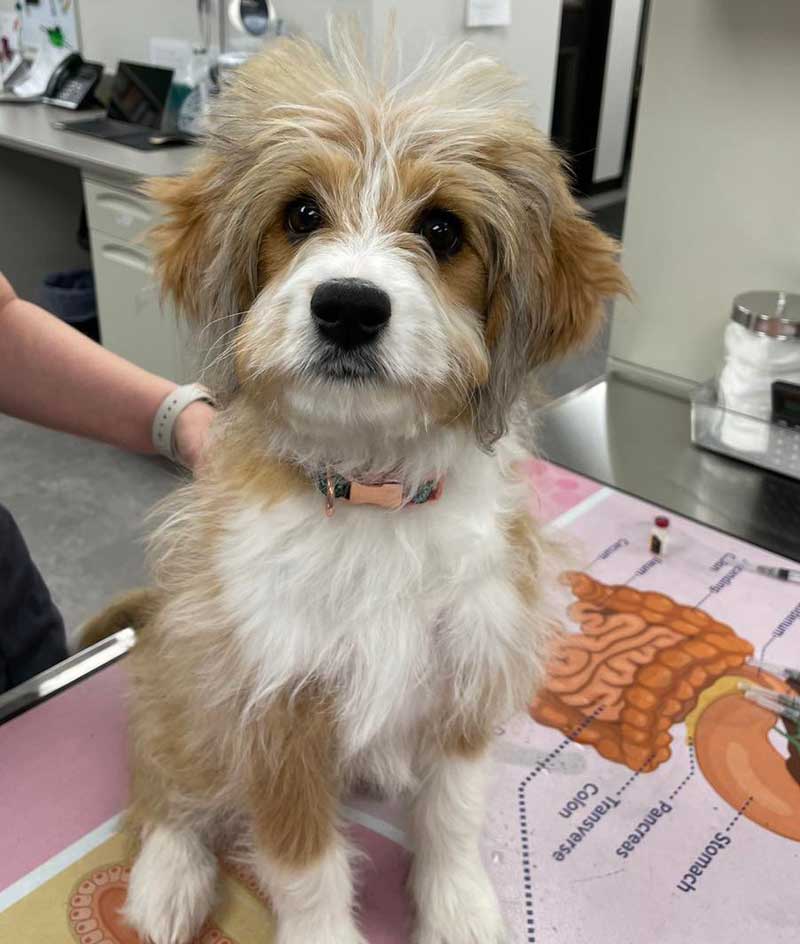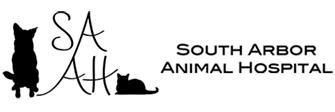FAQs
Answers to some of your most common questions:
After-Hours or Weekend Emergencies
We are not able to accommodate emergencies at this time. Please contact one of the hospitals listed on our Emergency Resources page if you need urgent care for your pet.
Appointments
Exams and consultations are by appointment. Same day appointments may be available for sick patients and emergencies. Please call us at (734) 973-7224 to set up an appointment that is convenient with your schedule.
Prescription Policy
Prescription Refills.
- Please give us as much notice as possible when refills are needed.
- At South Arbor Animal Hospital, we understand that there may be times when your pet’s medications may be obtained from alternative sources other than our hospital. We are willing to write prescriptions for outside pharmacies but please be fully informed about the issues related to online pharmacies before you decide to purchase your pet’s medications. Please be aware that your pet is required by law to be examined at least once in the past year to continue to refill medications. You will find our in-house pharmacy prices are very competitive with other online pharmacies and we urge you to talk with us first before purchasing your pet’s medications from another source.
Fees
The fees we charge for services are based upon what is needed to maintain the high quality of care we are proud to provide. Payment is required at the time service is rendered. We accept all Visa, Mastercard, Discover, debit cards, personal checks, cash and Care Credit.
When is the best time to spay or neuter my pet?
We recommend spaying or neutering every pet, and we recommend spaying or neutering your pet around 6 months. This recommendation may vary based on each individual pet. Please schedule an appointment to discuss spaying or neutering your pet with our veterinarian.
How do I know if my pet is in pain?
It can sometimes be difficult to tell. If you are not sure but suspect your dog or cat may be hurting, or is just not acting right, call us to have us examine your pet. Some signs of pain are more obvious, such as limping, but some signs are more subtle and can include: not eating, a change in behavior or normal habits, being more tired and having less energy. Of course, these symptoms can also be caused by many problems, so early observation and action is important.
Vaccinations
Vaccines are an important part of your dog or cat’s health care. Vaccines keep your pet healthy and prevent serious diseases. Our veterinarians will make sure your pet avoids these serious diseases through annual wellness exams and a vaccination schedule based on your pet’s lifestyle, health and individual circumstance. We have a “Free Vaccines for Life” program to keep your pet at their healthy best.
How often does my pet need a Rabies vaccination?
The first Rabies shot your pet receives is good for 1 year. Subsequent canine Rabies vaccinations immunize your pet for 1- 3 years depending upon the vaccine your pet receives. For cats, we use feline exclusive Rabies vaccines which are good for 1 year. Dogs and Cats are required by Michigan State Law to be vaccinated against Rabies.
What is heartworm protection and how many months should my pet be on heartworm prevention medication?
Heartworm disease is a serious disease transmitted by infected mosquitoes and if left untreated can be fatal. Heartworm prevention is administered once a month either by pill or by topical application. Depending on the specific product you and your veterinarian choose for your pet, heartworm prevention medication can prevent other parasite infestations including internal parasites (worms) and external parasites (fleas and ticks). In accordance with the guidelines of the American Heartworm Society, we recommend all dogs and cats be given year-round (12 months) heartworm prevention regardless of lifestyle.
Why does my dog need a blood test before purchasing heartworm prevention?
Your dog will need to be tested with a simple blood test for heartworm disease on an annual basis. Dogs could get sick (vomiting, diarrhea, and/or death) if placed on heartworm prevention when they have heartworm disease. Even if they have been on heartworm prevention year round there is always the possibility that the product may have failed for various reasons (your pet spit out the pill, did not absorb the pill appropriately, topical medicine was not applied properly, forgot to administer medication on time, etc.) and the earlier we can treat your pet for heartworm disease the better the prognosis. Some companies will guarantee their product providing you use the heartworm prevention year round and are performing yearly heartworm tests. When starting heartworm prevention it is important that you perform an initial heartworm test.
My pet never goes outside so does it really need heartworm prevention?
Heartworm disease is transmitted through the bite of a mosquito and all mosquitoes can get into houses.
Doesn’t the fecal sample test for heartworms?
No. Heartworm disease is a blood-borne disease that is transmitted through mosquitoes. A simple blood test will confirm whether or not your dog has heartworm disease.
How can I prevent fleas?
It is important to prevent fleas. We recommend all dogs and cats be given monthly flea prevention regardless of lifestyle. Not only are they uncomfortable for your pet, but fleas are also carriers of diseases, such as tapeworms. There are many medications for the treatment and prevention of fleas. Some medications are in a combined form with the monthly heartworm medication. Not only is this convenient, but it reduces the cost of two medications!
Why does my pet need a dental cleaning and how often should this be done?
Many of the pets that visit us on a regular basis need professional teeth cleaning. When bacteria irritate the gum line, the gums become inflamed in the early stages of dental disease causing gingivitis. Left untreated, this leads to periodontal disease which causes the loss of the bone and gingival support structure of the tooth and subsequent tooth loss. In addition, the bacteria are consistently released into the bloodstream allowing for systemic infections, which can cause damage to internal organs, such as the kidneys, liver, and heart. A dental exam is a part of any physical exam at South Arbor Animal Hospital. Through routine physical exams, our veterinarians will guide you on when and how often your individual pet will need teeth cleaning.
Do I need to brush my pet’s teeth at home?
Yes. Proper dental care at home is highly recommended to help maintain the oral health of your dog and cat. Home dental care for companion animals should start early, even before the adult teeth erupt. It is best if owners brush their dogs and cats' teeth frequently. Although tooth brushing is the best method of preventing plaque, calculus, and bacterial build-up, there are many options for dental home care. Other oral home care options such as dental-formulated foods, water additives, and dental treats can be considered and discussed with our veterinarians.
Why does my pet need to be admitted several hours before a surgical procedure?
In preparation for the procedure, your pet will receive:
- Pre-anesthetic exam
- Pre-medication to ease anxiety and to smooth the induction of anesthesia
- Placement of an intravenous catheter to deliver medications and fluids that support blood pressure and organ function during anesthesia
- In addition to the above, it gives your pet a chance to acclimate to the hospital environment to make the situation less stressful.
This all needs to be completed BEFORE your pet’s scheduled procedure time.
What should I bring for my pet’s hospital stay?
If your pet is on a special diet or on any medications, you should bring these with you to the hospital. You may also bring a toy or special item for your pet. We will do our best to make sure belongings stay with your pet; however these items occasionally go missing in the laundry, so we cannot guarantee their return.
Are there any special at-home care instructions for my dog or cat before undergoing surgery?
Please do not feed your pet after midnight the evening before a scheduled procedure. There is no restriction on drinking water that evening, but the water bowl should be removed first thing in the morning (6:00 a.m.) of the procedure. Plan to arrive at the office at the appointed time and allow 15-30 minutes for check-in procedures.
Is anesthesia safe for my pet?
At South Arbor Animal Hospital, we take all anesthetic cases very seriously. We utilize the safest, multi-modal approach that is individually created for each dog or cat. It includes injectable medications for sedation and pain management as well as gas anesthetic agents. The combination of pre-anesthetic assessment of your pet (including blood work), use of modern anesthetic agents, and the latest anesthetic monitoring equipment mean that anesthesia is generally considered to be a very low risk for your pet.
When we place your dog or cat safely under general anesthesia, a breathing tube is inserted into the trachea (windpipe) to administer oxygen mixed with the anesthetic gas. As with people, an intravenous catheter is placed into your pet’s leg to infuse it with fluids during the procedure. Once the procedure is completed and the anesthetic is turned off, oxygen is continued to be delivered to your pet until your pet wakes up and the tube is removed.
We closely monitor your pet during the procedure and the recovery process using advanced monitoring equipment. Parameters often monitored include oxygen concentration in the bloodstream (pulse oximetry), electrocardiogram (EKG), core body temperature, respiratory rate, heart rate, blood pressure, and carbon dioxide level. The monitoring findings allow us to perform safe anesthesia.
What is a multi-modal approach to anesthesia?
A multi-modal approach refers to the layered administration of small amounts of different medications to achieve the desired levels of anesthesia and pain management. We administer lower doses of each individual anesthetic which generally equates to fewer side effects, complete pain relief, and faster post-operative recovery.
How will you manage my pet’s pain during surgery?
We believe in performing surgery with advanced pain management techniques because we want to maximize the comfort of your pet during and after his or her procedure. Comfort control improves your dog or cat’s recovery and speeds up the healing process. We administer pain medication before beginning the procedure, during and post-operatively as needed by your pet.
My pet is older, is anesthesia safe?
Anesthesia in otherwise healthy, older pets is considered safe. It is important to have recommended pre-operative testing performed prior to anesthesia to check major organ function and allow us to tailor the anesthesia to any pre-existing medical conditions.
My pet has kidney and heart disease, is anesthesia safe?
Prior to anesthesia, patients with kidney disease should be fully evaluated with blood tests, urinalysis, and possible ultrasound. Cardiology patients should also be evaluated including blood tests, chest x-rays, and echocardiogram (ultrasound of the heart). Our veterinarians will determine based on each individual situation if it is safe for your pet to undergo anesthesia.
When my pet is having surgery, when should I expect an update on my pet?
You will receive a call from one of our veterinary assistants when your pet is in recovery from the procedure. If there are any abnormalities on the pre-anesthetic exam or blood work, you will receive a call prior to the procedure in case we need to change plans. Remember that no news is good news, and you will be contacted immediately should the need arise. Your pet’s veterinarian will be available at discharge to discuss the procedure and discharge instructions with you in detail, as well as answer any questions.
After surgery, when will my pet be able to go home?
Pets undergoing outpatient procedures will be ready to go by the close of business the same day unless noted otherwise during the post-operative phone update.

